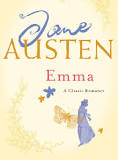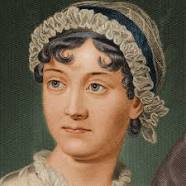Emma Page #36
Emma, by Jane Austen, is a novel about youthful hubris and the perils of misconstrued romance. The story takes place in the fictional village of Highbury and the surrounding estates of Hartfield, Randalls, and Donwell Abbey and involves the relationships among individuals in those locations consisting of "3 or 4 families in a country village". The novel was first published in December 1815 while the author was alive, with its title page listing a publication date of 1816. As in her other novels, Austen explores the concerns and difficulties of genteel women living in Georgian–Regency England; she also creates a lively comedy of manners among her characters and depicts issues of marriage, gender, age, and social status.
She stopt to blush and laugh at her own relapse, and then resumed a more serious, more dispiriting cogitation upon what had been, and might be, and must be. The distressing explanation she had to make to Harriet, and all that poor Harriet would be suffering, with the awkwardness of future meetings, the difficulties of continuing or discontinuing the acquaintance, of subduing feelings, concealing resentment, and avoiding eclat, were enough to occupy her in most unmirthful reflections some time longer, and she went to bed at last with nothing settled but the conviction of her having blundered most dreadfully. To youth and natural cheerfulness like Emma's, though under temporary gloom at night, the return of day will hardly fail to bring return of spirits. The youth and cheerfulness of morning are in happy analogy, and of powerful operation; and if the distress be not poignant enough to keep the eyes unclosed, they will be sure to open to sensations of softened pain and brighter hope. Emma got up on the morrow more disposed for comfort than she had gone to bed, more ready to see alleviations of the evil before her, and to depend on getting tolerably out of it. It was a great consolation that Mr. Elton should not be really in love with her, or so particularly amiable as to make it shocking to disappoint him--that Harriet's nature should not be of that superior sort in which the feelings are most acute and retentive--and that there could be no necessity for any body's knowing what had passed except the three principals, and especially for her father's being given a moment's uneasiness about it. These were very cheering thoughts; and the sight of a great deal of snow on the ground did her further service, for any thing was welcome that might justify their all three being quite asunder at present. The weather was most favourable for her; though Christmas Day, she could not go to church. Mr. Woodhouse would have been miserable had his daughter attempted it, and she was therefore safe from either exciting or receiving unpleasant and most unsuitable ideas. The ground covered with snow, and the atmosphere in that unsettled state between frost and thaw, which is of all others the most unfriendly for exercise, every morning beginning in rain or snow, and every evening setting in to freeze, she was for many days a most honourable prisoner. No intercourse with Harriet possible but by note; no church for her on Sunday any more than on Christmas Day; and no need to find excuses for Mr. Elton's absenting himself. It was weather which might fairly confine every body at home; and though she hoped and believed him to be really taking comfort in some society or other, it was very pleasant to have her father so well satisfied with his being all alone in his own house, too wise to stir out; and to hear him say to Mr. Knightley, whom no weather could keep entirely from them,-- “Ah! Mr. Knightley, why do not you stay at home like poor Mr. Elton?” These days of confinement would have been, but for her private perplexities, remarkably comfortable, as such seclusion exactly suited her brother, whose feelings must always be of great importance to his companions; and he had, besides, so thoroughly cleared off his ill-humour at Randalls, that his amiableness never failed him during the rest of his stay at Hartfield. He was always agreeable and obliging, and speaking pleasantly of every body. But with all the hopes of cheerfulness, and all the present comfort of delay, there was still such an evil hanging over her in the hour of explanation with Harriet, as made it impossible for Emma to be ever perfectly at ease. CHAPTER XVII Mr. and Mrs. John Knightley were not detained long at Hartfield. The weather soon improved enough for those to move who must move; and Mr. Woodhouse having, as usual, tried to persuade his daughter to stay behind with all her children, was obliged to see the whole party set off, and return to his lamentations over the destiny of poor Isabella;--which poor Isabella, passing her life with those she doated on, full of their merits, blind to their faults, and always innocently busy, might have been a model of right feminine happiness. The evening of the very day on which they went brought a note from Mr. Elton to Mr. Woodhouse, a long, civil, ceremonious note, to say, with Mr. Elton's best compliments, “that he was proposing to leave Highbury the following morning in his way to Bath; where, in compliance with the pressing entreaties of some friends, he had engaged to spend a few weeks, and very much regretted the impossibility he was under, from various circumstances of weather and business, of taking a personal leave of Mr. Woodhouse, of whose friendly civilities he should ever retain a grateful sense--and had Mr. Woodhouse any commands, should be happy to attend to them.” Emma was most agreeably surprized.--Mr. Elton's absence just at this time was the very thing to be desired. She admired him for contriving it, though not able to give him much credit for the manner in which it was announced. Resentment could not have been more plainly spoken than in a civility to her father, from which she was so pointedly excluded. She had not even a share in his opening compliments.--Her name was not mentioned;--and there was so striking a change in all this, and such an ill-judged solemnity of leave-taking in his graceful acknowledgments, as she thought, at first, could not escape her father's suspicion. It did, however.--Her father was quite taken up with the surprize of so sudden a journey, and his fears that Mr. Elton might never get safely to the end of it, and saw nothing extraordinary in his language. It was a very useful note, for it supplied them with fresh matter for thought and conversation during the rest of their lonely evening. Mr. Woodhouse talked over his alarms, and Emma was in spirits to persuade them away with all her usual promptitude. She now resolved to keep Harriet no longer in the dark. She had reason to believe her nearly recovered from her cold, and it was desirable that she should have as much time as possible for getting the better of her other complaint before the gentleman's return. She went to Mrs. Goddard's accordingly the very next day, to undergo the necessary penance of communication; and a severe one it was.--She had to destroy all the hopes which she had been so industriously feeding--to appear in the ungracious character of the one preferred--and acknowledge herself grossly mistaken and mis-judging in all her ideas on one subject, all her observations, all her convictions, all her prophecies for the last six weeks. The confession completely renewed her first shame--and the sight of Harriet's tears made her think that she should never be in charity with herself again. Harriet bore the intelligence very well--blaming nobody--and in every thing testifying such an ingenuousness of disposition and lowly opinion of herself, as must appear with particular advantage at that moment to her friend.
Translation
Translate and read this book in other languages:
Select another language:
- - Select -
- 简体中文 (Chinese - Simplified)
- 繁體中文 (Chinese - Traditional)
- Español (Spanish)
- Esperanto (Esperanto)
- 日本語 (Japanese)
- Português (Portuguese)
- Deutsch (German)
- العربية (Arabic)
- Français (French)
- Русский (Russian)
- ಕನ್ನಡ (Kannada)
- 한국어 (Korean)
- עברית (Hebrew)
- Gaeilge (Irish)
- Українська (Ukrainian)
- اردو (Urdu)
- Magyar (Hungarian)
- मानक हिन्दी (Hindi)
- Indonesia (Indonesian)
- Italiano (Italian)
- தமிழ் (Tamil)
- Türkçe (Turkish)
- తెలుగు (Telugu)
- ภาษาไทย (Thai)
- Tiếng Việt (Vietnamese)
- Čeština (Czech)
- Polski (Polish)
- Bahasa Indonesia (Indonesian)
- Românește (Romanian)
- Nederlands (Dutch)
- Ελληνικά (Greek)
- Latinum (Latin)
- Svenska (Swedish)
- Dansk (Danish)
- Suomi (Finnish)
- فارسی (Persian)
- ייִדיש (Yiddish)
- հայերեն (Armenian)
- Norsk (Norwegian)
- English (English)
Citation
Use the citation below to add this book to your bibliography:
Style:MLAChicagoAPA
"Emma Books." Literature.com. STANDS4 LLC, 2025. Web. 11 Jan. 2025. <https://www.literature.com/book/emma_29>.




Discuss this Emma book with the community:
Report Comment
We're doing our best to make sure our content is useful, accurate and safe.
If by any chance you spot an inappropriate comment while navigating through our website please use this form to let us know, and we'll take care of it shortly.
Attachment
You need to be logged in to favorite.
Log In